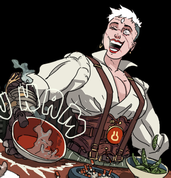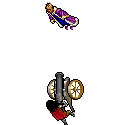ChickenWing posted:And as someone who knows incredibly little about music theory, there's literally nothing wrong with that line to me. Well then I suppose it's a good thing these books were written specifically for you, thus negating the need for Rothfuss to do any research on "things SA forum poster ChickWing knows incredibly little about."
|
|
|
|
|

|
| # ? May 27, 2024 19:14 |
|
Also, speaking of music, any piece can be played sadly, or blithely, or with any other emotional intent, regardless of key/etc. It might sound really weird to hear an upbeat jazz piece played 'sadly,' but you can definitely do it. Rothfuss tries to make this point when Kvothe plays an easy piece of music and makes it look hard and a hard piece of music and makes it look easy, but once again, he does it in the most ham-fisted, over-explained manner possible.
|
|
|
|
Patrick Rothfuss is not a feminist. This is not because he is a man, but because his work is profoundly unfeminist. Of course, he identifies as feminist. He runs in liberal social circles, and is aware enough to know that "feminist" is a good thing to be, so he makes sure to loudly declare himself feminist and to write the "feminist" trait on his character sheet. But beyond the most basic level of "doesn't actively hate women", he doesn't really understand what being a feminist entails and doesn't bother to think critically about his stance toward women. He just assumes that, having declared himself a feminist, he is now perfect, and therefore anything he writes is inherently feminist because it was written by a feminist. There's a famous quote that most people want to be a writer or to have written, but don't actually want to write. As another year draws to a close with no progress on the Doors of Stone, it seems more and more applicable to Rothfuss's writing. But I think a similar sentiment is true of his feminism as well. Rothfuss desperately wants to already be a feminist, but has no interest in actually putting in the work required to get there. Because Rothfuss is a feminist, Kvothe is not a rapist. But he's not not a rapist in the passive sense that most decent people are; instead, he will monologue at length about the sheer extent to which he is not a rapist. When Denna is knocked out by fantasy heroin, Kvothe spends multiple paragraphs discussing how he could totally have raped her if he wanted to but he chose not to because he's better than that. When affected by a drug that makes him unable to distinguish between right and wrong or sensible and stupid, Kvothe speaks at length about how he still totally couldn't rape anyone because it's as unthinkable to him as breaking the laws of physics. And then there's the Fake Ruh segment. There's a sense of insincerity, of desperation in all of these scenes. It's very easy to write a fantasy hero who isn't a rapist: just don't show him raping anyone. That could be accomplished by letting the drugged Denna sleep without a speech about how great Kvothe is for not raping her. But Rothfuss isn't satisfied with that; he really needs to make sure you, the reader, know that he, Patrick Rothfuss, is very much not a rapist. To use a cliche, he desperately wants a cookie for meeting the absolute minimum standard of not being a complete monster. Meanwhile, Rothfuss uses rape just to add extra dark edginess to a character's backstory without it going anywhere serving any other literary purpose, and has his hero feel up a drugged child sex slave against her will. The same cookie-seeking insincerity and hypocrisy permeates throughout his treatment of women. Consider Fela. First: Rothfuss knows that using women as damsels in distress is a lovely thing to do because other people in his social circles have said so. But he can't resist using her as a damsel in distress anyhow. His compromise solution -- use her as a damsel in distress, then when she breaks down in tears over a damsel in distress have Kvothe flirtatiously say that she could probably have saved herself anyhow -- is pathetic. You don't get points for saying "the thing I just did was lovely, but it's okay because I don't think I really did it anyhow". Second: Kvothe gives Fela a lecture about how she's friendzoning Sim because Sim is a Nice Guy but everyone just pays attention to bad boys. WMF Chapter 25 posted:“You’re underestimating him,” I said. “People do it all the time. Sim’s smart.” Third: We're told that Fela learned the name of stone, which as a powerful magic skill makes her integral to the plot to break into Ambrose's rooms. By which of course I mean she never uses the name of stone, her role is to distract Ambrose with her boobs. Rothfuss cannot resist putting women in their place (not that he would phrase it that way), no matter how strong he intends their character to be. Even Devi, by far the best-written woman in the series, is willing to trade sex for money. Since Rothfuss believes he is a feminist, he believes women are automatically well-represented in his work. But this could not be further from the truth. Men vastly outnumber women in the story; even his core wizard school Harry Potter trio has two Rons and no Hermione. But the problem isn't that he hasn't met the correct %women quota; the problem is why he has fallen so far short of the mark. The reason is that by default, every character he writes is male. Characters are only female when there is a specific reason for them to be -- almost always because they have a male love interest, but occasionally for reasons like "is a leader of a matriarchal society". Here is, to my knowledge, an exhaustive list of women in the series who could have been men instead without changing anything else or making a straight interaction gay: Nina And here is a very much non-exhaustive list of men in the series who could have been women instead with the same constraints: Chronicler Crazy Martin Old Cobb Graham Jake Shep Caleb Carter (the list is already eight times as long as the other list without even leaving Newarre) Trip Teren The mayor of that town that Kvothe's dad bullies Baron Greyfallow Baron Jakis Count Threpe Duke of Gibea Teccam Trapis Tehlu Encanis Jax Aleph Aethe Selitos The chandrian except Lanre Dagon Caudicus Stapes Skarpi Puppet Anker Tempi The one-armed chef (this is the best character in the series) The tinker on the road The tinker on the road (the other one) Mayor Anwater Elodin Exla Dal Kilvin Lorren All the other Masters except Hemme Breton Skarpi Marten Skoivan Schiemmelpfenneg The father and son who pick Kvothe up from the forest after his parents die The boys on the streets of Tarbean (except the stripper) The lordling Kvothe uses to gain access to the Maer's palace The guy Kvothe pays for information about said lordling The crossbow salesman The two latecomers Hemme doesn't sexually harass The university tuition-taker guy who sets up an incoherent scheme with Kvothe The others who accompanied Kvothe and Denna to the university for the first time The bandits who rob Chronicler The bandits who rob the tax collectors Taborlin the Great And that's just the characters I remember. If you pay attention to the sexes of the nameless extras, they're pretty much all male -- unless accompanied by their boyfriend. The only women in Kvothe's troupe are his mother and the one who gives Abenthy a "special private dance". I have no memory of Viari's existence, but the wiki informs me that he exists and is male. Those of you who are doing rereads and planning on defending the book here, this is something you should be conscious of while reading. I think you'll find that once you see it, you can't unsee it. Of course, if you think I'm wrong, if you think I'm being unfair, feel free to prove me wrong. Find me the missing women. Good luck. These lists are far more disproportionate in length than a simple comparison of the number of men versus the number of women in the story. That is because this particular gap is not a consequence of the lack of women in Kingkiller; it is the cause of the lack of women. Or rather, it reveals the cause. Since much fewer than half the characters need to be women, much fewer than half the characters are women. Whether he realizes it or not, Rothfuss views male as the default. Whether a character's gender doesn't matter, Rothfuss automatically makes that character male without even thinking about it. People are men; women are women. This is distressingly common in fiction written by men. It is something that male authors who claim to be feminist should be conscious of. But Rothfuss has no interest in learning, or improving, or even considering that he might have flaws. He gives himself the feminist tag and thereafter believes he is already perfect. Perhaps he has some slight subconscious awareness of this flaw, or at least this effects; Bast comments at one point that all the women in Kvothe's story are beautiful. Like the line about Denna's nose not being perfect, the intended reading of that line seems to be that Kvothe views his numerous love interests with rose-tinted eyes. But the real truth behind that line is that women do not have a place in Rothfuss's world except to be beautiful. The first woman over the age of 35 does not appear until near the end of the second book, after almost two thousand pages of text. The first man over the age of 35 appears on page one. They may wield swords at times, but invariably they are wives, mothers, girlfriends, and prostitutes. And because that is ultimately how he views women, Rothfuss is not a feminist.
|
|
|
Ornamented Death posted:Well then I suppose it's a good thing these books were written specifically for you, thus negating the need for Rothfuss to do any research on "things SA forum poster ChickWing knows incredibly little about." Golly, I think you're right. Good thing everyone else that reads fantasy has a deep knowledge of musical theory and even knows what a minor chord is or how it sounds different than the corresponding major chord, otherwise they might think the book was written for them too
|
|
|
|
ChickenWing posted:Golly, I think you're right. Good thing everyone else that reads fantasy has a deep knowledge of musical theory and even knows what a minor chord is or how it sounds different than the corresponding major chord, otherwise they might think the book was written for them too You're missing the point. Part of Rothfuss's job as a writer is to research things he doesn't know about if he plans on incorporating them into his writing. He very clearly did not do that. You are defending a man for not doing his job.
|
|
|
|
|
ChickenWing posted:Golly, I think you're right. Good thing everyone else that reads fantasy has a deep knowledge of musical theory and even knows what a minor chord is or how it sounds different than the corresponding major chord, otherwise they might think the book was written for them too I know nothing of musical theory. That line is incredibly, comically bad. Sad is the worst word that already clumsy sentence could end on. It's a terrible way to describe music, or sound, or anything really. Just read it aloud, and you can see the astoundingly bad rhythm of that sentence. Don't forget the emphasis on that monosyllabic finish. "I moved a finger and the chord went minor in a way that always sounded to me as if the lute were saying sad." Say sad out loud. Draw it out. Imagine someone saying sad in a plaintive voice. That's how silly it is. BravestOfTheLamps fucked around with this message at 21:16 on Nov 8, 2016 |
|
|
|
Benson Cunningham posted:Also, speaking of music, any piece can be played sadly, or blithely, or with any other emotional intent, regardless of key/etc. It might sound really weird to hear an upbeat jazz piece played 'sadly,' but you can definitely do it. See https://www.youtube.com/watch?v=B9MShtCg4fk the Imperial March played in a major key...
|
|
|
|
It is easier to understand if you think of it in terms of music. Sometimes a man enjoys a symphony. Elsetimes he finds a jig more suited to his taste. The same holds true for lovemaking. One type is suited to the deep cushions of a twilight forest glade. Another comes quite naturally tangled in the sheets of narrow beds upstairs in inns. Each woman is like an instrument, waiting to be learned, loved, and finely played, to have at last her own true music made. Some might take offense at this way of seeing things, not understanding how a trouper views his music. They might think I degrade women. They might consider me callous, or boorish, or crude. But those people do not understand love, or music, or me. -- a feminist who definitely understands music, and women, and is qualified to tell other people that they don't
|
|
|
|
^^ so many bad lines in these books I've blocked out of my mind. Lottery of Babylon posted:These books are feminist because Rothfuss is a feminist and he says he's feminist and he writes feminist books. Kvothe says rape is bad, it's super-bad, and he doesn't rape anyone even though he easily could have, which is feminist. Fela is a strong female feminist character who has done all sorts of cool things, so when trouble brews, she's there with her friends, ready to be rescued and to use her cleavage as a distraction. Instead of being repressed by the patriarchy, women are free to have sex with whoever they want, which is Kvothe, which is me. Women should do that in real life too, I guess they're just not feminist enough. This is unironically how he (and his fans) think. anilEhilated posted:How are they entertaining? There's no plot, there's no action, there's no characterization, there's no conflict that isn't immediately resolved? Where's the fun? He ~subverts the genre/tropes~ (except he doesn't) and uh... worldbuilding!  In a just world, someone like Robin Hobb would have Rothfuss's fame and he'd just be another faceless nobody in the Kindle Unlimited library. Atlas Hugged posted:But nothing happens in his books for pages and pages, chapters and chapters. I also never understood the "turn your brain off thing". There are both good and bad action movies. See: Mad Max versus Transformers. If I'm picking up a book, I'm explicitly not turning my brain off. That doesn't mean it has to be the highest quality text in the world, but it should inspire something in me. The best example of a "turn your brain off and enjoy the movie" flick is The Expendables. Like, I'm pretty sure Stallone and others hyped the movie by saying things along the lines of "this is 80s action from start to finish, story is just there to move the explosions along" and that's exactly what I went in expecting and got. Complete with amazing/cheesy one-liners and Terry Crews ripping bad guys apart with an auto-shotgun. ChickenWing posted:And as someone who knows incredibly little about music theory, there's literally nothing wrong with that line to me. Rothfuss also knows little (or nothing) about music. Lines like that, and Kvothe's freakout when he hears music but can't play along, is not how non-severely-damaged musicians think. There are better ways to word that line, it's just an example of where his writing comes across as blunt or falls flat. Like in the Stormlight books when Wit's playing music while talking to Kaladin it's not amazing but it's far better than anything Rothfuss writes and in Sanderson's case neither character has music as a major aspect of who they are. Though Wit's also a somewhat over the top character in his own right. Hughlander posted:See https://www.youtube.com/watch?v=B9MShtCg4fk the Imperial March played in a major key... Well I found my Clinton Victory Fanfare, thanks.
|
|
|
|
Lottery of Babylon posted:And because that is ultimately how he views women, Rothfuss is not a feminist. This is a great and telling post.
|
|
|
BravestOfTheLamps posted:I know nothing of musical theory. This is the bit where he gets to hold the lute for the first time on the road from Tarbean to the University, right? In context, that part really isn't that bad. On it's own, yeah, the line is bad. In context, it's Kvothe coming back to playing after an extended period of not doing so. Pre-Tarbean introduces us to him ascribing non-musical things to music. This line is Kvothe remembering that. He hasn't touched a lute in ages, gets this one, and is hesitant to start. The line enforces the simpleness of it. He's previously done all this "leaves falling in the winter and swishing in the wind and water swirling around a rock in the stream and whatever the gently caress else" for his music on his own, and now all he's doing is making the lute say sad because he's so tentative about the whole process. It's a triumphant moment because he's coming back into touch with that part of himself. Or at least, that's how I interpreted it.
|
|
|
|
Evil Fluffy posted:The best example of a "turn your brain off and enjoy the movie" flick is The Expendables. Like, I'm pretty sure Stallone and others hyped the movie by saying things along the lines of "this is 80s action from start to finish, story is just there to move the explosions along" and that's exactly what I went in expecting and got. Complete with amazing/cheesy one-liners and Terry Crews ripping bad guys apart with an auto-shotgun. I was actually going to use this as my "turn your brain off" example rather than "generic action movie" but it didn't work for me because the expendables is a hilariously self-aware self-parody and I didn't want anyone thinking that I thought Rothfuss put that level of thought into his writing  Expendables is great though. I never thought I'd laugh at a Chuck Norris joke after no longer being a teenager.
|
|
|
|
|
Lottery of Babylon posted:The university tuition-taker guy who sets up an incoherent scheme with Kvothe The rest of your post is excellent, but the scheme makes sense. It might even seem clever if you weren't aware of the concept of insurance fraud. Well, it's a mix of insurance fraud and ballooning costs in higher education due to the large availability of student loan offerings. Filtered through a sixth grader's understanding of macroeconomics then exported into a fantasy setting.
|
|
|
|
ChickenWing posted:This is the bit where he gets to hold the lute for the first time on the road from Tarbean to the University, right? In context, that part really isn't that bad. On it's own, yeah, the line is bad. In context, it's Kvothe coming back to playing after an extended period of not doing so. Pre-Tarbean introduces us to him ascribing non-musical things to music. This line is Kvothe remembering that. He hasn't touched a lute in ages, gets this one, and is hesitant to start. The line enforces the simpleness of it. He's previously done all this "leaves falling in the winter and swishing in the wind and water swirling around a rock in the stream and whatever the gently caress else" for his music on his own, and now all he's doing is making the lute say sad because he's so tentative about the whole process. It's a triumphant moment because he's coming back into touch with that part of himself. No, no. This takes place when he's playing for Felurian and distracting her after having just fought her with magic.
|
|
|
|
ChickenWing posted:This is the bit where he gets to hold the lute for the first time on the road from Tarbean to the University, right? In context, that part really isn't that bad. I touched the last string and tuned it too, ever so slightly. I made a simple chord and strummed it. It rang soft and true. I moved a finger and the chord went minor in a way that always sounded to me as if the lute were saying sad. I moved my hands again and the lute made two chords whispering against each other. Then, without realizing what I was doing, I began to play. The strings felt strange against my fingers, like reunited friends who have forgotten what they have in common. I played soft and slow, sending notes no farther than the circle of our firelight. Fingers and strings made a careful conversation, as if their dance described the lines of an infatuation. Then I felt something inside me break and music began to pour out into the quiet. My fingers danced; intricate and quick they spun something gossamer and tremulous into the circle of light our fire had made. The music moved like a spiderweb stirred by a gentle breath, it changed like a leaf twisting as it falls to the ground, and it felt like three years Waterside in Tarbean, with a hollowness inside you and hands that ached from the bitter cold. It really loving is.
|
|
|
|
PJOmega posted:The rest of your post is excellent, but the scheme makes sense. It might even seem clever if you weren't aware of the concept of insurance fraud. Explain how a) Kvothe doing worse on his exams to raise his tuition rates supports this scheme; without b) The university's records being so bad that the tuition-taker guy could just straight-up pocket tuition money from anyone whenever he wants without Kvothe's help. The sensible approach to the scheme is to give the Maer a higher bill than Kvothe's officially-assigned tuition and pocket the gap. But that's obviously not how Kvothe is doing it, since that wouldn't depend on his exam results at all. In fact, better exam results would let them pocket more while sending the Maer the same bill.
|
|
|
|
Lottery of Babylon posted:Whether he realizes it or not, Rothfuss views male as the default. Whether a character's gender doesn't matter, Rothfuss automatically makes that character male without even thinking about it. People are men; women are women. This is distressingly common in fiction written by men. It is something that male authors who claim to be feminist should be conscious of. But Rothfuss has no interest in learning, or improving, or even considering that he might have flaws. He gives himself the feminist tag and thereafter believes he is already perfect. As you pointed out, it's less about being prescriptive in what Rothfuss "should have" done with any given character and more that in observing the pattern of what he does do we tend to find he is lacking in imagination. Which is really his greatest offense in my eyes, and the thing most depressing about the genre and the root of many of its problems. It's not that writers like Rothfuss aren't writing more diverse or nuanced or surprising worlds and characters, but that it seems like they can't even when claiming they do.
|
|
|
|
ChickenWing posted:This is the bit where he gets to hold the lute for the first time on the road from Tarbean to the University, right? In context, that part really isn't that bad. On it's own, yeah, the line is bad. In context, it's Kvothe coming back to playing after an extended period of not doing so. Pre-Tarbean introduces us to him ascribing non-musical things to music. This line is Kvothe remembering that. He hasn't touched a lute in ages, gets this one, and is hesitant to start. The line enforces the simpleness of it. He's previously done all this "leaves falling in the winter and swishing in the wind and water swirling around a rock in the stream and whatever the gently caress else" for his music on his own, and now all he's doing is making the lute say sad because he's so tentative about the whole process. It's a triumphant moment because he's coming back into touch with that part of himself. Context doesn't turn bad prose into good prose. It just tells us why the line is there. How the line is written is just as important as what is in the line. The larger point too is that it's laughably obvious that Rothfuss knows jack loving poo poo about musicians and that he never bothered to find out what a musician's relationship to music is. His poor quality of research shows up in the poor quality of writing.
|
|
|
BravestOfTheLamps posted:It really loving is. k
|
|
|
|
|
I mean, sure, you don't like it, and it's probably not great mechanically and is violating some meter I've never heard of, but it sounds nice to me (other than two chords whispering against each other that's silly)
|
|
|
|
|
Evil Fluffy posted:
Chiming in to say that Hobb owns, and that the Farseer trilogy does a much better job of "precocious outsider learns what it is to suffer while doing awesome things" than anything Rothfuss has written. Especially when the protag gets called out for, frankly, acting like a protagonist
|
|
|
|
Lottery of Babylon posted:The sensible approach to the scheme is to give the Maer a higher bill than Kvothe's officially-assigned tuition and pocket the gap. But that's obviously not how Kvothe is doing it, since that wouldn't depend on his exam results at all. In fact, better exam results would let them pocket more while sending the Maer the same bill. Yup. The scheme doesn't work. Kvothe makes 50% of his tuition over 10 talents. If the bursar is overcharging the Maer, there's no reason not for this to be a flat fee. quote:Afterward I returned to the bursar’s office. I officially presented Alveron’s letter of credit to Riem and unofficially collected my agreed-upon cut: half of everything over ten talents. Of course then there's no reason for the bursar not to jack the price up to the Maer even more...the whole section makes no sense.
|
|
|
|
Lottery of Babylon posted:Explain how It's not good, and it's keeping with thewhole fabrication of Kvothe being "morally clever." It makes sense _in the larger purview of Kvothe/Rothfuss not understanding simple things. On phone so this is going to be a bit disjointed. Apologies in advance. If Kvothe spoke with the Tuition Master (or TM) and simply told him to charge the Maer (is that really how it's spelled? gently caress this book) more then that would be "immoral." Straight up fraud even. So it has to be given a "clever" justification, to show how "clever" Kvothe is. In the same way that Kvothe's actions with the false Edemame Roux (much better spelling) are justified post hoc to the reader even though they make no sense at the time. This behavior isn't immoral in the book's view in much the same way. To note, Kvothe can't ever be a fraud in the book. His grifts and tricks always have to be justified. Here, it's justified by the Maer cruelly sending him away with a ludicrously excessive gift (but not the cookie of patronage). Then it's doubly justified by the mean Maesters who charge tuition on a sliding scale. These same Maesters who were so impressed by his Lord Sue-ness that they charged him negative tuition on his first year. Never forget he is special. Or speshul. To a point, I'm sure that this whole exchange is solely informed by Rothfuss' lip service to liberal fiscal issues in academia. The accounting issue IS a problem, but I can only imagine what a pre-computer academic fiscal book would look like. Since the TM is obviously Not A Upright Person, we as the readers are likely meant to infer that there is a fine tradition of graft. So again, it makes sense in and only in the weird nest of Rothfussian attributes. I'm likely giving it more thought here than he did writing it, but there's that.
|
|
|
|
Hughlander posted:See https://www.youtube.com/watch?v=B9MShtCg4fk the Imperial March played in a major key... Can you make your point explicit because I don't know what the gently caress you're trying to say, other than it's often humorous to transpose the key of a piece. Also, I just realized that Rothfuss writes like a lot of first drafts read. You just throw a bunch of darts to try to translate your thoughts to the paper. Bad metaphors, similes, and allegories abound, alliteration runs rampant, and you probably put 2-3x as many commas as you need because you're trying to capture each individual thought as you build the picture. Then you're supposed to go back and edit, to crystalize a cohesive narrative from the confusing mash you've pulped out thus far. Annnnnnd that step seems to have been skipped. Benson Cunningham fucked around with this message at 22:19 on Nov 8, 2016 |
|
|
|
Strom Cuzewon posted:Chiming in to say that Hobb owns Counterpoint: The Soldier Son Trilogy.
|
|
|
|
Benson Cunningham posted:Can you make your point explicit because I don't know what the gently caress you're trying to say, other than it's often humorous to transpose the key of a piece. I believe the point there is that a song can be made happier or sadder by transposing the key, without changing anything else. In particular, as we all know, anything in D Minor (the saddest of all keys) will make people weep instantly.
|
|
|
ulmont posted:Counterpoint: The Soldier Son Trilogy. Oh no three bad books in an otherwise stellar career.
|
|
|
|
|
Ornamented Death posted:Oh no three bad books in an otherwise stellar career. So stellar she had to change her name!
|
|
|
ulmont posted:So stellar she had to change her name! I'm sorry you don't understand how pseudonyms work.
|
|
|
|
|
ulmont posted:I believe the point there is that a song can be made happier or sadder by transposing the key, without changing anything else. I don't think anyone was denying that. But if you're in an orchestra and the conductor is asking you to "play it sadder," she's not telling you to change what key you're playing in. She's asking you to change your intensity, volume, timing, etc. I was indicating that the latter case is what is generally referred to when discussion emotion in playing music. Also, B-flat minor man. Adagio for Strings is the saddest song of all time.
|
|
|
|
Ornamented Death posted:I'm sorry you don't understand how pseudonyms work. Megan Lindholm wasn't selling anymore in the early '90s. Jumping to Robin Hobb was a decision made to start over at the time (and admitted in publishing circles in the late '90s), whatever she may say now. Benson Cunningham posted:Also, B-flat minor man. Adagio for Strings is the saddest song of all time. https://www.youtube.com/watch?v=NgViOqGJEvM
|
|
|
|
There's a bit of Venetian history I read. Commoners in some corner of the Venetian maritime empire, maybe Croatia, had brought a suit against some feudal lord. But one of the plaintiffs in the case was murdered by the bastard child of said lord. It was incidental to the history, but it raises a lot of questions. What drives men to do that? What is it like to be part of a family such as that? What is it like to live in a world like that? How does it warp people? These are questions Robin Hobb is not prepared to answer in her book about a bastard child working for as an assassin for their feudal family.
|
|
|
ulmont posted:Megan Lindholm wasn't selling anymore in the early '90s. Jumping to Robin Hobb was a decision made to start over at the time (and admitted in publishing circles in the late '90s), whatever she may say now. And? She never actually stopped publishing as Lindholm, you know, she just chose to do her novels under the Hobb pseudonym. Which is kind of the point, or at least one possible point, of a pseudonym. So, again, sorry you don't know how pseudonyms work.
|
|
|
|
|
Ornamented Death posted:She never actually stopped publishing as Lindholm, you know, she just chose to do her novels under the Hobb pseudonym. ...because she could no longer sell novels under the Lindholm name; I agree.
|
|
|
ulmont posted:...because she could no longer sell novels under the Lindholm name; I agree. After which she has had a stellar career, minus one pretty bad trilogy. I'm really not seeing where we're actually disagreeing beyond you trying to be pedantic. She was all over the place (in terms of particular type of fantasy) when writing under her real name. That didn't work, she came up with a pen name and decided to focus on more epic fantasy, and has seen great success with that.
|
|
|
|
|
ulmont posted:...because she could no longer sell novels under the Lindholm name; I agree. Yeah, this isn't controversial. Her career was dead under her real name, and she felt her new series coming from a "new" author might succeed in a way it wouldn't coming from mediocre water treading Megan Lindholm.
|
|
|
Number Ten Cocks posted:Yeah, this isn't controversial. Her career was dead under her real name, and she felt her new series coming from a "new" author might succeed in a way it wouldn't coming from mediocre water treading Megan Lindholm. I never meant to imply it was, I just don't think it really counters the claim that she's had a great career. Sure, it all happened after adopting the pen name but...does that really matter?
|
|
|
|
|
BravestOfTheLamps posted:There's a bit of Venetian history I read. Commoners in some corner of the Venetian maritime empire, maybe Croatia, had brought a suit against some feudal lord. But one of the plaintiffs in the case was murdered by the bastard child of said lord. It was incidental to the history, but it raises a lot of questions. What drives men to do that? What is it like to be part of a family such as that? What is it like to live in a world like that? How does it warp people? Oh yeah, Hobb is pulp fantasy. But it's good pulp. The kind you get in orange juice. It's still an absolute act of cowardice to make all of Fitz's targets easy to justify. Strom Cuzewon fucked around with this message at 23:24 on Nov 8, 2016 |
|
|
|
Strom Cuzewon posted:Oh yeah, Hobb is pulp fantasy. But it's good pulp. The kind you get in orange juice. No, Hobb isn't that. There's no excitement of pulp in it. Hobb just doesn't even have the decency to engage properly what is the principal subject of the book: how a child becomes a royal assassin. When it comes to telling a story about assassination and political intrigue, she throws in a few lines about how FitzChivalry poisoned some aristo. There's pages and pages wasted on nonsense like telepathy instead of the meat of the story, which is violence and intrigue. And Hobb is kind of an inverse of Rothfuss in that she's really obsessed with how the story can poo poo on the main character some more, but it's not any more true or entertaining than Kingkiller's long and wearisome handjob to Kvothe. BravestOfTheLamps fucked around with this message at 23:31 on Nov 8, 2016 |
|
|
|

|
| # ? May 27, 2024 19:14 |
|
Fitz doesn't actually do a lot as an assassin, so I'd argue against him becoming an assassin being the principal subject of the books. Misleading titles, I guess, but his training in the Skill was probably more important than his training as an assassin, especially if you factor in the later books. I agree that reading a book or series about the moral implications of turning a bastard child into a royal assassin would be pretty interesting, but that's clearly not the story Hobb set out to tell. I generally don't criticize authors for not delivering something they never promised in the first place, but death of the author and all that, I suppose.
|
|
|
|

















